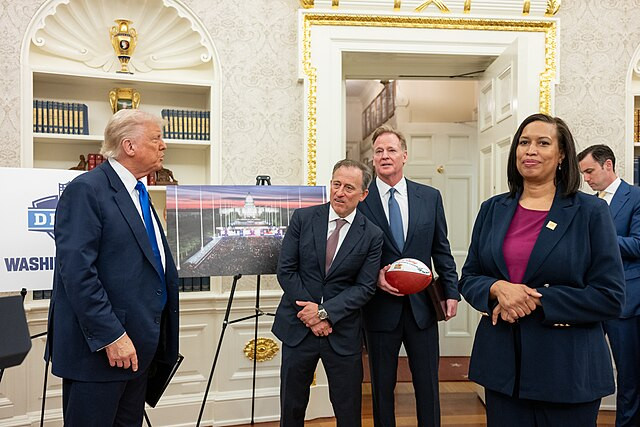President Donald Trump's decision to federalize Washington, D.C.'s police and deploy the National Guard has placed Mayor Muriel Bowser in one of the most challenging political positions of her tenure, forcing her to navigate between defending the city's autonomy and working with an administration she has clashed with in the past.
The White House said Monday that roughly 850 federal law enforcement officers and agents were dispatched across the city, making 23 arrests ranging from homicide and drug crimes to fare evasion and reckless driving. Trump, in announcing the move, described Bowser as "a good person who has tried," but said he acted because "she has been given many chances."
Bowser called the federal intervention "unsettling and unprecedented," yet also acknowledged she lacked the legal authority to block the president's plan. "The fact that we have more law enforcement and presence in neighborhoods, that may be positive," she said Monday, while also noting the arrangement underscores D.C.'s lack of full self-governance.
In a virtual meeting with community leaders on Tuesday, Bowser took a sharper tone, calling the president's actions an "authoritarian push" and urging residents to "protect our autonomy, to protect our Home Rule, and get to the other side of this guy."
The District of Columbia operates under a "home rule" charter granted by Congress in 1973, allowing residents to elect a mayor and council but leaving ultimate legislative authority to Congress. Federal law gives the president power to take control of the Metropolitan Police Department and activate the National Guard during emergencies-authority Trump invoked this week despite falling violent crime rates in the city.
Bowser's calibrated response contrasts with other Democrats' outright condemnations. House Minority Leader Hakeem Jeffries said Monday, "The Trump administration has consistently broken the law and violated the Constitution to further the personal and political agenda of a wannabe king." Los Angeles Mayor Karen Bass, who has faced similar federal troop deployments, called Trump's moves "a stunt."
Bowser, who traveled to Trump's Mar-a-Lago estate after his election victory and removed a giant "Black Lives Matter" street mural under Republican pressure earlier this year, has a history of strategic engagement with the former president. Political analyst Tom Sherwood noted she is "tending to the weather-vane attitude of President Trump" while trying not to provoke him into more aggressive measures.
Activist groups, including the Free DC project, have denounced the crackdown, likening it to state violence. "We will not be idle as oppressors' structures try to harm our communities and take power," said organizing director Nee Nee Taylor, who nonetheless said she believes Bowser "is standing up to the best of her ability."
The deployment has drawn national attention, with municipal leaders in other cities expressing concern. Cleveland Mayor Justin Bibb said, "We do not want the National Guard in our cities," but defended Bowser's approach, noting her limited autonomy compared with state governors.






